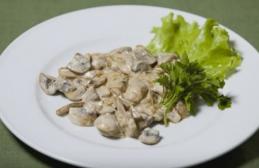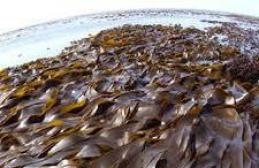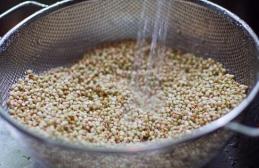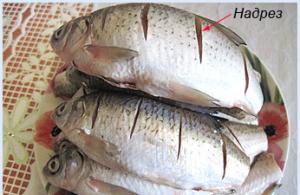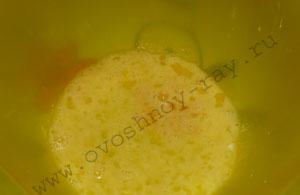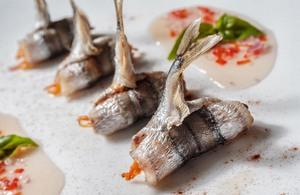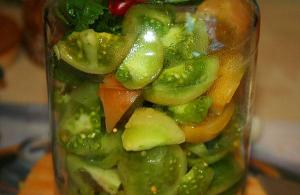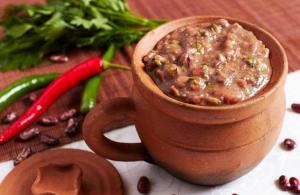Vodka, which was prepared by the Russian people many years ago, is significantly different from modern alcohol. Ancient recipes for Russian vodka are still available today; with their help you can taste the real taste of strong alcohol. Previously, vodka was often prepared using medicinal herbs and other products that endowed the alcoholic drink with healing properties.
Check out the best options for making homemade vodka using an old recipe.
Instead of alcohol, you can use vodka, but then there is no need to dilute it with water.
Ancient Russian vodka based on quince
This is another recipe for old Russian vodka, which is made from quince. Required ingredients:
- quince juice – 8 glasses;
- vodka – 8 glasses;
- a bunch of rye straw;
- sugar and vanilla sugar - 50 g each.
Prepare old quince vodka like this:
- Chop a bunch of straw using a knife.
- Grind the overripe quince fruits and squeeze out the juice with your hands using gauze.
- Combine the prepared juice with alcohol.
- Add sugar and vanilla sugar to this mixture, stir until completely dissolved.
- Pour into a bottle, leave in a dark place for a week, filter and place in the refrigerator for storage.
Vodka of the Russian nobility "Erofeich"
The following ingredients are used to prepare this Russian alcoholic drink:
- mint – 35 grams;
- anise – 35 grams;
- crushed orange nuts – 35 g;
- vodka purified on birch charcoal – 1 l.
Prepare vodka of the Russian nobility “Erofeich” according to this recipe:
- Place all components in a jar, mix well and leave to infuse in a warm, dark room for 12 days.
- The finished alcoholic tincture does not need to be filtered.
Russian vodka from moonshine
You will need:
- 1 liter of moonshine;
- chopped ginger root – 10 g;
- bitter capsicum – 10 g;
- cloves – 5 g;
- cinnamon – 5 g;
- lemon zest – 10 g;
- nutmeg – 5 g;
- cardamom – 5 g.
Preparation:
- Place all ingredients in a saucepan and mix well with a wooden spoon.
- Close the heat-resistant pan with a lid, tie it to the ears of the pan, coat it with unleavened dough so that air does not penetrate inside the container.
- Place some weight on top of the lid and place the pan in the oven or well-heated oven for 12 hours.
- After the specified time has passed, remove the “casserole” from the stove or oven, cool, pour into bottles and seal tightly with stoppers.
Store this vintage vodka in the refrigerator or basement.
Vintage vodka with cherry juice
To prepare vodka according to this ancient recipe, prepare the following components:
- 1 liter of vodka;
- cloves – 10 pcs.;
- zest of two oranges;
- cherry juice – 250 ml.
Preparation:
- Place the orange zest and cloves in a clean jar and fill these ingredients with vodka. Leave for 14 days in a dark room.
- After 2 weeks, strain the tincture and add cherry juice to it. If the alcoholic drink turns out to be very strong, you can increase the amount of juice in it.
- Filter the drink again, pour into small containers and store in tightly sealed jars in a cool place.
Old Russian spiced vodka

Required Products:
- vodka – 500 ml;
- nutmeg – 10 g;
- 5 grams each of cloves, saffron and cinnamon;
- 20 g vanilla;
- sugar – 400 g.
Russian vodka is prepared according to this recipe as follows:
- All the spices and herbs are placed in a glass jar and filled with the alcoholic component.
- The container with these contents is placed in a dark, cool place for 14 days. It is important to shake the jar well every day.
- After the specified period, the tincture should be strained several times, pour sugar into it, put on fire and bring to a boil.
- Cool the tincture, strain and pour into small containers with airtight lids. Store this drink in a cool place.
Russian vodka with coffee and oak bark
You will need:
- lemon;
- 1/3 nutmeg;
- 2 tbsp. l. Sahara;
- 14 coffee beans;
- 50 g crushed oak bark;
- vanillin on the tip of a knife;
- 3 liters of vodka.
Prepare an ancient alcoholic drink like this:
- Cut the lemon into 4 parts and remove the seeds.
- Grate 1/3 of the nutmeg.
- Add sugar, coffee beans, crushed oak bark and vanillin to these ingredients.
- Pour this mixture into 3 liters of alcohol, mix well, close the lid and leave for 2 weeks in a dark, cool room. Shake the tincture daily.
- After 14 days, filter the drink, pour into smaller containers, and store in the refrigerator or basement.
Old Russian vodka “Varenukha”
Required components:
- 1 liter of moonshine;
- dried apples – 40 g;
- dried cherries – 40 g;
- dried pear – 25 g;
- prunes – 25 g;
- ginger, cinnamon, cloves - 1 g each;
- 0.5 g allspice;
- 1 bay leaf;
- liquid honey – 250 g.
How to prepare “Varenukha”:
- Dried apples, cherries, pears and prunes are washed and placed in separate containers. Each type of dried fruit is poured with 500 g of moonshine and infused for 5 hours.
- Next, all the vodka is poured into one ceramic or enamel pan, honey and all the spices are added.
- Cover the pan with a lid and carefully cover it with unleavened dough to prevent air from penetrating inside the container.
- Place a weight on top of the lid and place it in the oven or preheated oven for 10 hours. It is important that the temperature is maintained at 90 degrees during this time.
- After the specified time, the “varenukha” must be strained and drunk hot.
Preparation of Russian vodka with pepper and garlic
Drink components:
- 4 cloves of garlic;
- 3 pods of hot red pepper;
- 3 liters of moonshine.
Preparation:
- Peel the garlic, chop finely.
- Wash, peel and chop the red hot pepper with a knife.
- Place these components in 3 liters of moonshine and leave for a week in a dark room.
- Pass the finished peppercorns through a filter several times, pour into bottles and place in the refrigerator for storage.
Without a doubt, “Erofeich” can be attributed to the original Russian an alcoholic drink, the recipe of which was created during the reign of Catherine II. This drink is often called Count Orlov's tincture, recipe the preparations of which have survived to this day. The classic “Erofeich” was prepared through a complex procedure for distilling bread wine and had a strength of about 80 degrees. After distillation, the resulting product was necessarily infused with various herbs and roots, due to which the drink had medicinal properties, a rich aroma and an original taste.
Today everyone can prepare this traditional old Russian product using time-tested classic recipes.
Some features of the ancient drink
 Thanks to its healing properties and unique taste, in the 19th century “Erofeich” enjoyed enormous popularity on the Russian alcohol market and was a worthy competitor to foreign wines.
Thanks to its healing properties and unique taste, in the 19th century “Erofeich” enjoyed enormous popularity on the Russian alcohol market and was a worthy competitor to foreign wines.
There are several classic recipes "Erofeich", which can differ significantly in the composition and infusion time of the drink. The classic composition of the tincture includes about three dozen different herbs and moonshine with a strength of at least 60 degrees. A distinctive feature of “Erofeich” is the complete absence of sugar in its composition, however, there are recipes that include sweet ingredients: honey, raisins or dried fruits. Depending on what herbs and roots were used to make the tincture, its color can vary, from light brown to coffee.
If you are starting to prepare this drink for the first time, it is better to start with simple recipes that include no more than 10 ingredients. By strictly following the recipe, you can prepare a wonderful drink that will benefit your body and restore peace of mind.
Cooking with moonshine
If we consider the classic options for creating tinctures "Erofeich", recipes for moonshine, without a doubt, are the oldest and are especially popular among connoisseurs of this drink.
To create the simplest and most common option"Erofeich", you will need:

All ingredients are placed in a glass jar or bottle and filled with moonshine, after which the container must be put in a warm place and allowed to brew for half a month. You must remember to stir the tincture from time to time. After infusion, the drink is filtered and stored in a cool, dark place, where it can be stored for a long time without loss of taste.
The classic recipe for “Erofeich” does not involve the use of granulated sugar, but if you want to sweeten the bitters, you can add a little natural honey to it. It is not recommended to use vodka to prepare the product according to this recipe, since it does not have sufficient strength, which, in turn, will not allow all the taste and healing properties of the drink to be revealed.
Another traditional recipe for “Erofeich” is more complex and will require the following products:
- 1 liter of moonshine;
- about 8 grams of chopped galangal root;
- approximately 3 grams of sage leaves;
- 2 anise blossoms;
- 3 grams of dill;
- 2 grams of St. John's wort;
- 2 grams of lemon balm leaves;
- About 3 grams of crushed licorice roots.
These products must be placed in a glass container and filled with alcohol. The drink prepared according to this recipe must be infused for at least 20 days. After filtering, the tincture is bottled and stored in a cool place.
“Erofeich”, made according to this recipe, has a delightful herbal aroma and has a deep cognac color.
The tincture will acquire a very original citrus aroma and slight pungency if you add ginger root to its composition. To prepare “Erofeich” with ginger you will need:

These components are placed in a jar, filled with alcohol and infused for 15 days. After filtration, the resulting tincture is mixed with moonshine with a strength of no more than 50 degrees. It is better to carry out the mixing procedure gradually, constantly tasting the drink until it acquires the taste you need.
Infusing with vodka
If you are not involved in moonshine brewing, you can use recipes for making “Erofeich”, which use vodka as an alcohol-containing base. Legendary tincture Count Orlov, grandma's recipe which is passed down from generation to generation, was made specifically on a vodka basis.
For one of the most antique recipes for “Erofeich” with vodka you will need:

The ingredients are placed in a large glass container and infused for about 20 days, while the tincture must be stirred daily.
A drink prepared according to this recipe will help cope with colds and lift your spirits.
Can be cooked vodka "Erofeich", recipe which was mentioned by Alexander Sergeevich Pushkin in the work “The Young Lady-Peasant Woman”. For this you will need:
- 1 liter of good vodka;
- 15 grams of peppermint;
- 10 grams of anise seeds;
- 30 grams of chopped orange nuts.
You need to mix vodka with the rest of the ingredients and leave for 15 days, stirring occasionally. Despite the simplicity of the recipe, this drink has excellent taste and has healing properties.
It is very important to remember that “Erofeich” insists on medicinal herbs and excessive consumption of this drink can adversely affect health.
Attention, TODAY only!
There are people who, after mixing alcohol with ordinary water, sincerely believe that they have prepared real vodka. But in fact, this mixture will very vaguely resemble the store-bought version. Real homemade vodka is prepared using strict technology. It includes some features. You can't exclude any of them if you want to get high-quality homemade alcohol.
A mandatory device that you cannot do without in the process of making vodka is an alcohol meter. It will determine exactly how strong the alcohol is at the right time. You can make an alcoholic drink without it. But the alcohol you take according to your prescription may have a different strength than what is indicated on the label. Therefore, you will receive vodka with the required degree only if you take all the ingredients with pharmacy precision.
Making homemade vodka
Choosing the most important ingredient - alcohol
We will need ethyl alcohol - either regular food grade or medical grade. The further organoleptic properties of our drink depend on its quality. If you doubt that this is pure ethyl alcohol, be sure to check it for methyl content, and do this in several ways. Remember that methyl alcohol can not only be harmful to health, it is deadly to a living organism. Moreover, organoleptics will not help in this case - it does not have any differences in color, taste, or smell.
Alcohol is divided by grade. GOST defines several of them that are suitable for preparing alcoholic beverages. This:
- Alpha.
- Luxury
- Extra.
- Basis.
- Highest purity.
Wheat, rye or a mixture of these grains - it is from these raw materials that the best alpha alcohol is prepared. If you mix potatoes and grain, you can get either extra, basic, or luxury varieties. The quality of these alcohols is lower. The less potatoes are used in their production, the better. But highly purified alcohol is made from any raw material that contains starch. This could be potatoes, molasses, beets, and other types of raw materials. The cheapest vodka is made from the highest purity variety.
In theory, you can also use strong moonshine that has undergone double distillation. However, this will no longer be a classic recipe for making homemade vodka. Therefore, use this option only as a last resort.
Choosing water

This ingredient is extremely important. Do not neglect the choice of water, because it affects both the transparency and the softness and taste of alcohol. Do not use mineral or tap liquid. To make alcohol you need H2O, which is minimally saturated with minerals and salts. However, water cannot be boiled or distilled. After all, in this case the ingredients will mix extremely poorly.
To make vodka at home, it is best to use bottled water. Be sure to ensure that the concentration of minerals and salts in the bottle you choose is minimal. The most chic option is to use water that is intended for baby food.
Prepare the rest of the ingredients
If you simply dilute alcohol with water, you will get alcohol that tastes very strong and slightly dries out the tip of your tongue. So we need to do a little magic to give it a milder taste. For this we need one of these ingredients:
- glycerin – per 1 liter of alcohol – up to 5 mg;
- glucose (from the pharmacy) – per 1 liter of vodka – 10-20 ml;
- granulated sugar - per 1 liter of alcohol - 1 tablespoon.
If you are preparing vodka from expensive alcohol, then it is best to add glucose to the recipe. It is considered the best option.

In addition, you can add lemon juice to your “masterpiece”. It will not only soften the alcohol, but also give it a pleasant aroma. For 1 liter of vodka, 30 ml of freshly squeezed lemon juice is enough.
Mixing ingredients
In our country, Russia, vodka has a minimum strength of 40 degrees, and a maximum strength of 56. These are the indicators we will look at when we choose the proportions for dilution. Many people like alcohol at 45% ABV, however, you can choose any option that suits you. Let's say you took 10 liters of alcohol with a strength of 90%, and you want to get 45% vodka. This means you will need exactly 10 liters of water. If you need vodka with a strength of 40 degrees, then add 12.5 liters of water. Calculating all this is extremely simple.
So, the mixing process itself must be consistent; this is the only way homemade vodka from alcohol will turn out to be of excellent quality. Take a large container, thoroughly rinsed before preparing the alcoholic drink. There should be no foreign odors in it. Pour water into it, and then add the ingredients necessary to soften the drink. This can be sugar, glucose, glycerin, freshly squeezed lemon juice. Introduce alcohol into the liquid in a thin stream. Close the container with a lid and stir it for a few minutes, shaking it. Now the vodka should stand for at least 2-3 hours.
Purification and filtration
This stage is optional, however, it should not be neglected. The fact is that during filtration, all impurities that are considered harmful to the body are removed from your alcoholic drink. The easiest way to do this at home is to pass the vodka through a new water purification filter (for example, “Barrier”).
The second option is to take a funnel, put cotton wool on it, then either activated carbon tablets or birch charcoal. Of course, this option cannot be compared with the first in terms of effectiveness, but if you chose high-quality ingredients for mixing at the very beginning of the recipe, then it is quite enough.
The last stage is settling and bottling

To improve the organoleptic properties of your homemade vodka, put it in the refrigerator for 3-10 days. After this, it can be poured into glass bottles and tightly closed. Now you can taste it!
Klyukovka, zubrovka - perhaps that’s all we usually drink from tinctures, which is familiar and always on the shelf in the store. But tinctures, together with weaker liqueurs, are a whole huge world into which each of us who has apple trees, currant and raspberry bushes growing in the garden can look into.
Igor Kekhter, former mayor of Suzdal and author of the book “Insist on your own. Secrets and recipes for liqueurs from the cellars of the Golden Ring": In the old days there were no shops where you could buy alcohol, or drinks in general. Everything they drank was made themselves, in their own households. It was even good practice among the nobles to keep a large cellar with liqueurs and tinctures, to make drinks for each letter of the alphabet. They treated neighbors to homemade drinks, showed off and shared recipes. Each owner had his own secrets for making tinctures.
Pouring or tincture
First, let's understand the terms, what is the difference between tincture and liqueur? Both drinks are made using strong alcohol and various additives. Only the liqueur is much weaker, its strength is about 25 degrees. Liqueurs are made from berries and fruits with the obligatory addition of sugar, and tincture is strong alcohol to which herbs and spices are added. Historically, tinctures were medicine, while drinks were originally made to be served. Yes, and most importantly, at the end of preparation, the liqueur must be exposed to the sun - to pour - hence the name.Tinctures
The technology for preparing tinctures is simple: take strong alcohol (vodka, moonshine, alcohol) and infuse selected raw materials on it until essential oils, all tastes and smells are transferred into alcohol. In Rus', tinctures became widespread in the 15th century, they were often used by Sergius of Radonezh, valued above all else the soothing tincture of motherwort. Gradually, tinctures became a mass product, used not only for treatment.Erofeich. One of the most famous drinks. According to legend, Erofeyich lived in the 18th century, he was a barber and spent several years in China, as part of the Russian mission. There he learned Eastern healing techniques. Erofeich cured Count Orlov of his illness, for which he received the privilege of producing and selling drinks under his own name.

Liqueurs
The liqueurs are prepared in two stages. First, fruits or berries, covered with sugar and doused with alcohol, are aged until they release their juice. After which the liqueur is filtered and exposed to the sun.The best ingredients
Nevezhinskaya rowan. It was first found by Pyotr Smirnov, supplier to the court of His Imperial Majesty, who passed on the title of “vodka king” to his son, Arseny. To keep the secret of their signature tincture, the Smirnovs renamed it from Nevezhinskaya to Nezhinskaya. To preserve the place where unique mountain ash is collected.Vladimir cherry. It is considered one of the best for making liqueurs; it is juicy, high in sugar, and unusually aromatic.
Apples. Autumn apple varieties are best suited for winemaking, especially Antonovka and Slavyanka.
Raspberries. Gives liqueurs an unforgettable aroma. Moreover, it is best to use wild berries, they are the most fragrant.
Spices. The most commonly used are cinnamon, cloves, cumin, and fenugreek. Excellent tinctures are made with almonds.
Recipes for liqueurs and tinctures

Cucumber “For Friends”
Recipe by Igor Kekhter3 liters of vodka
100 g pickled gherkins
180 ml cucumber marinade
150 g horseradish root
Step 1. Pour vodka over all ingredients and close the container.
Step 2. Leave for 2 weeks, strain, pour into clean bottles.
Honeysuckle and lingonberry liqueur

Recipe by Maxim Rybakov, brand chef of the Pushkarskaya Sloboda hotel complex, Suzdal 1 liter of grain or apple distillate
150 g honeysuckle
100 g honey
50 g lingonberries
Step 1. Mash the dried berries with honey in a glass or wooden bowl. Step 2. Transfer the berry mass into a bottle and mix with distillate.
Step 3. Seal the bottle and leave for 3-5 days in a dark place.
Step 4. Strain the liqueur and pour into bottles.
Step 5. Cool.
Persimmon liqueur

Recipe by Sergei Volkov, bartender of the Ogurets restaurant, Suzdal
0.5 l vodka
400 g sugar
400 g dense persimmon
4 g fenugreek
1 tbsp. ground carob
Step 1. Wash the persimmon, dry it, cut it into 4-6 pieces.
Step 2. Place persimmons in wide-necked jars, sprinkling with sugar.
Step 3. Cover the persimmons with spices and pour vodka. Seal the containers.
Step 4. Infuse for 3-4 weeks in a warm, bright place, for example, on a windowsill on the south side of the house.
Step 5. Strain the liqueur and pour into clean bottles.
Tincture “Three peppers”

Recipe by Igor Kekhter
0.5 l moonshine
50 g yellow bell pepper
10-15 g red hot pepper
5 g allspice
Step 1. Cut sweet peppers into thin strips, remove seeds from hot peppers.
Step 2. Place sweet, hot and allspice peppers into the bottle.
Step 3. Pour in moonshine and leave in a dark place for 2 weeks.
Step 4. Strain the finished tincture and pour into a clean container. Store in a cool, dark place.
Let's get acquainted with the wonderful old recipes for vodkas and liqueurs, because many of them can be used in our time, surprising guests with the unusual tastes of holiday drinks.
Ivovka
8 glasses of quince juice, 8 glasses of vodka, a bunch of rye straw, 50 g each of sugar and vanilla sugar.
Chop a bunch of straw very finely and grate the overripe quince. Squeeze the juice out of this mixture. Mix the resulting juice with vodka. Add regular and vanilla sugar. Pour into a bottle and leave for a week. Filter.
Anisette vodka

Take 65 g of anise and 30 g of fennel, mix and grind, then take two-thirds of the resulting mixture, pour in 2 liters of vodka and 400 g of water, distill, preventing the whitish alcohol from getting into the resulting vodka. Put the remaining spices, leave for several days, sweeten with sugar dissolved in cold water (600 g per 3 l), filter.
Orange tincture

2 liters of vodka, 1 liter of water, sugar, 4-5 orange peels.
Boil syrup from refined sugar and 1 liter of water. Mix with vodka. Pour into a bottle and add orange peels. Place in the shade for 3-4 days. Filter and bottle.
Lingonberry-cherry liqueur

150 g cognac, 2 l vodka, 3.5 kg lingonberries, 600 g cherries, 2.5 l sugar syrup, citric acid.
Place all ingredients in a glass container, close tightly and leave. Filter the finished tincture and bottle it.
Clove vodka

For 1/4 bucket of alcohol, 4 cups of water, 6 spools of cloves, one spool of white cinnamon, 1/2 spool of lemon zest, 650 g of sugar.
(1 spool = 4.266 grams)
Wash the cloves and cinnamon thoroughly, dry, crush coarsely, and add to alcohol. After 2-3 weeks, clean the tincture and strain it.
"Erofeich"

Put 410 g of English mint, 410 g of anise, 410 g of coarsely crushed hazelnuts on a bucket of purified vodka, put all this in a large bottle for 12 days in a warm place. After this, you can consume it, draining the grounds or without draining, as you wish; You can again pour half a portion of vodka onto the grounds and put it in a warm place for a month.
Casserole

1 liter of homemade vodka, 10 g ginger, 10 g hot pepper, 5 g cloves, 5 g cinnamon, 10 g lemon zest, 5 g nutmeg, 5 g cardamom.
Mix all the ingredients in a saucepan, cover with a lid, which is tightly tied to the ears of the saucepan, coat with unleavened dough so that air does not pass through, put some weight on top and put in the oven or hot oven for 12 hours. After this, cool the pan, pour the casserole into bottles and seal with stoppers.
Needle

1 liter of vodka, 1 glass of pine cones, 80 g of caramel or sugar.
Pour vodka over young pine cones, immature, soft, green in color and leave for 2 weeks. Drain the infusion and squeeze out. Sweeten with sugar or caramel (burnt sugar).
Cranberry tincture

0.5 liters of vodka, a glass of cranberries, sugar to taste.
Crush the cranberries, mix with sugar, add vodka and keep in a sealed container for a week. Then squeeze the cranberry skins through cheesecloth.
Cinnamon vodka

Grind 32 g of cinnamon very finely, put it in a cube and pour in 2 liters of vodka and a small amount of water. Distill over moderate heat until all the flavor is released. Sweeten with sugar dissolved in cold water - 600 g per 2 liters of water.
Coffee vodka

Boil 1.5 kg of sugar in water, skimming off the foam. Pour 400 g of roasted ground coffee into this syrup and let it sour. Distill, add another 200 g of coffee and let stand in a tightly sealed container for several days. Distill. Vodka is made from chocolate in the same way.
Gooseberry tincture

1 liter of vodka, 1 liter of boiled water, 1 kg of gooseberries, sugar.
Pour vodka and boiled water over the gooseberries. Keep, stirring, in the sun for 2 weeks until the gooseberries float to the surface. Strain and add sugar to taste. Leave it in the sun again, then put it in the refrigerator for 10 days. Strain again, bottle and store in a cool place. Use after 3 weeks.
Lemon vodka

1 bottle of vodka, 2 medium-sized lemons.
Cut off all the yellow skin, trying to do it as thinly as possible, since the slightest presence of white skin gives the vodka an unpleasant, bitter taste. Leave for several days in a warm place, then filter the vodka in the usual way.
Lemon vodka (option 2)

Take one lemon and a piece of sugar, grate the lemon peel. Scrape the yellowed sugar onto a plate. This way, remove all the peel from the lemon. Add yellow sugar to vodka to taste.
Raspberry vodka

Pour mature, sorted raspberries with well-purified alcohol so that the berries are barely covered, and place in the sun. After 2-3 days, drain the alcohol.
For 4.1 liters of alcohol, take 3 glasses of water and 600 g of sugar. Boil water with sugar three times, skimming each time, and pour the raspberry-infused alcohol into the hot syrup (just enough for your finger to tolerate), little by little, stirring with a spoon.
Strain through flannel, on which you first place cotton wool, then coals, then another layer of flannel. Carefully seal the bottles of vodka and place in a warm place.
If you need to clarify vodka, then take 10-15 g of potassium permanganate for a quarter of a bucket of vodka (4.1 liters), dissolve it in a small amount of water and pour into the vodka, stirring quickly. The vodka will clear within 2-3 days; all that remains is to carefully drain and strain.
Lightly salted vodka

In the ridge where cucumbers grow, place a bottle or jar so that the cucumber will continue to grow inside that container. To do this, the ovary must be carefully pushed into the neck of the bottle or jar. When the cucumber grows, pinch it off the stem and pour good strong moonshine over it. The taste of vodka is the taste of lightly salted cucumber. If you pour store-bought vodka, you get the taste of a fresh cucumber.
Tangerine vodka

1 bottle of vodka, 2 medium tangerines
Peel the tangerines and put them in vodka. Infuse in a warm place, then filter in the usual way.
Tangerine tincture

0.75 l of vodka, 6 tablespoons of dried tangerine peel. Grind the peel, add vodka and leave for a week. Refrigerate before use.
Juniper vodka

Crush 600 g of juniper berries as finely as possible and pour in 6 liters of vodka. Leave for several days, distill over very low heat. The first 2.5 liters of vodka will be the best.
Juniper vodka (option 2)

Dissolve 1.6 liters of juniper berries in alcohol and mix with 12.3 liters of vodka.
Muscat vodka

17 g nutmeg, 2 liters of vodka.
Place the nuts in the vodka, seal tightly, and leave for a while.
Mint vodka

800 g of mint, a handful of salt and 1.2 kg of honey pour 12.3 liters of vodka.
Leave for 2-3 days and distill.
Autumn tincture

500 g of rowan, 1 kg of fragrant ripe apples (ranet), 300 g of sugar, 1.5 liters of vodka.
Rowan berries collected after frost should be thoroughly washed and dried. Cut the apples into rings, after removing the core. Place rowan berries and apples in layers, sprinkling each with sugar, and pour in vodka so that the fruits are completely covered. Cover with gauze and leave to stand at room temperature for 2-3 months until the berries discolor. Filter the tincture, bottle it and store it in a dark and cool place.
Aspen tincture

Pour 300 g of aspen buds into 1 liter of vodka.
In a week the tincture will be ready. When using, add 1 tablespoon of honey.
Hunting tincture

30-40 g juniper berries, 2 g ground black pepper, 50 g dill seeds, 10-12 g table salt, 40 g horseradish.
Pour all ingredients into 1 liter of strong vodka. Leave for 2 weeks in a warm place, shaking the contents occasionally. Then strain and filter.
Foamy vodka

Infuse 1 liter of vodka on a handful of juniper berries for two weeks, then on the peels of two lemons for 5 days. Mix a spoonful of crushed ginger with sugar and dilute it in infused vodka. Keep in the sun for two weeks. Strain, pour, store refrigerated. Drink in six months.
Pepper vodka

Infuse 0.7 liters of vodka with 25.6 g of black pepper beans for 2 weeks.
Pepper tincture

Infuse 2 liters of vodka with 70 g of pepper for 2 weeks, strain and dilute with weak syrup (200-300 g of sugar, 3-4 glasses of water). Leave in a warm place for several weeks, then carefully strain and bottle.
Wormwood double vodka

Pour 300 g of wormwood tops into 12 liters of plain vodka, add a handful of salt and leave for a week. After this, add 1.2 kg of honey and distill.
Wormwood tincture

Fill a 0.25-capacity bottle with fresh wormwood, add vodka and leave for 2-3 weeks. If the tincture is prepared from dried herbs, take 100 g per 1.5 liter. You can add lemon zest for flavor.
Festive vodka

For 1 liter of homemade vodka, take 1 teaspoon of soda and 1 teaspoon of citric acid, stir well.
Fisherman's tincture

For 1 liter of purified vodka 40-42%, take 3-4 cloves of garlic, finely chop and add 1.5-2 g of ground pepper, 10 g of table salt, 4-5 g of crushed bay leaves and 30 g of sugar. Leave for 4-5 days, shaking the contents daily. Then filter through a cloth filter.
Rowan vodka

Grind the ripe rowan berries in a mortar, put them in a tub until half full, add hot water, wrap the tub and tie it tightly so that the spirit does not escape, and keep it this way for twelve days, and when the rowan sours and the top of the tub becomes covered with thick stuff, like a wine mash, then take the mass from the tub with the grounds and distill it through the cube like mash, and in the fourth distillation there will be very good vodka.
French liqueur

Take a mixture of the following fragrant herbs: cardamom, galangal, ginger, cloves, cinnamon, anise at the rate of 43 g per quarter bottle of vodka.
Tea vodka

1 liter of vodka, 4 tablespoons of tea, 50-70 g of caramel.
Infuse black long tea in vodka for 3 hours, strain. Then fry the sugar in a frying pan until caramel forms, chop, add to vodka.
Rosehip vodka

Boil 800 g of rose hips in honey for an hour, strain through a sieve. Pour in 12.3 liters of 40% alcohol. Let it sit and bottle it. This vodka is extremely aromatic and tasty.
Elixir vodka

100 g cinnamon, 30 g each cloves, dill seeds, anise, cumin, 20 g each lavender and rosemary flowers, 800 g each lemon and orange peel, 2 handfuls each of thyme, oregano, mint, sage, 15 g galangal, 12 g each ginger, nutmeg, nutmeg flowers, 8 g cardamom, 12 g each angelica, calamus root, 4 g saffron.
Crush all the spices, pour in 12.3 vodka, leave for a week, distill and sweeten to taste.

